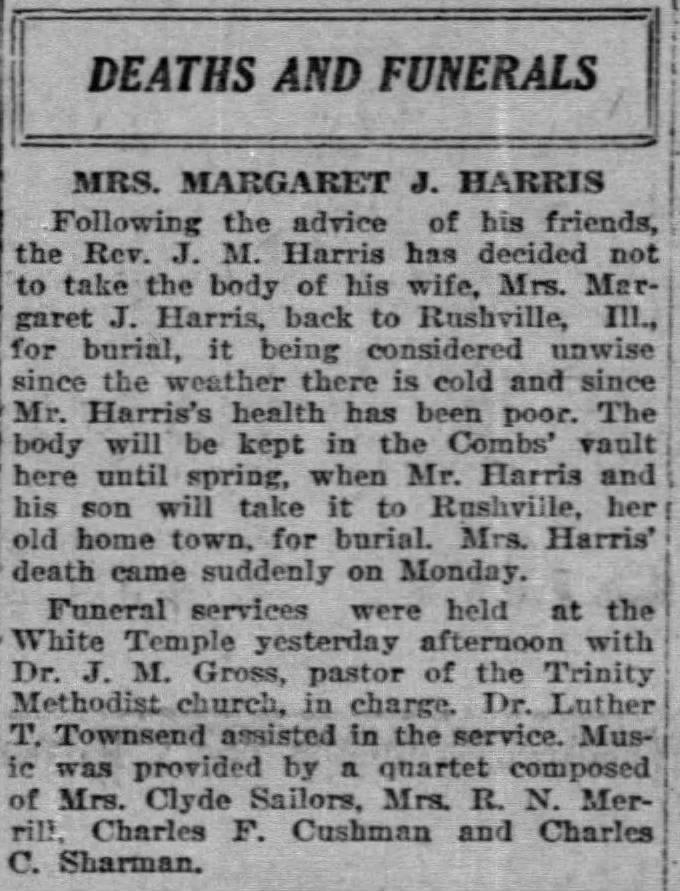Hymn History: I Will Praise Him
Author: Margaret Jenkins Harris
“Very little is known about Margaret Jenkins Harris … but untold numbers have been blessed by the singing of her hymn ‘I Will Praise Him’. … Her name will probably not be remembered by many.”
(Melody Publications)
The Origin of the Hymn “I Will Praise Him”
Among the hymns that celebrate the believer’s personal experience of salvation and the joy of wholehearted devotion to God, few are as radiant and triumphant as “I Will Praise Him.” Written by Margaret Jenkins Harris (1865–1919), this hymn is both a testimony and a declaration of faith. Born out of a deeply personal encounter with God’s grace, it has inspired generations of worshipers to lift their hearts in praise, no matter their circumstance.
The Life of Margaret Jenkins Harris
Margaret Jenkins Harris was born in 1865, and little is known about her early years. However, her life and ministry became closely connected with the Holiness Movement that swept through the United States in the late nineteenth and early twentieth centuries. This movement, rooted in Methodism, emphasized a deeper spiritual life, personal sanctification, and complete consecration to God.
Harris was a woman of strong faith and spiritual sensitivity. She became known for her involvement in evangelistic and camp meeting gatherings where she often led music or spoke on spiritual renewal. The testimonies from these meetings reveal that Harris lived what she wrote—her songs were not theoretical expressions but reflections of genuine personal experience.
Her best-known hymn, “I Will Praise Him,” emerged from a moment of profound spiritual awakening and surrender.
A Moment of Transformation
According to accounts preserved by hymn historians, Margaret Harris was attending a Holiness camp meeting when the inspiration for “I Will Praise Him” was born. During one of the services, she experienced what she later described as a powerful encounter with the Holy Spirit—an experience of cleansing and complete consecration.
In the midst of this spiritual moment, her heart was so filled with gratitude and love for Christ that she began to write the words that would become her most enduring hymn:
When I saw the cleansing fountain,
Open wide for all my sin,
I obeyed the Spirit’s wooing,
When He said, “Wilt thou be clean?”
These opening lines set the tone for the entire hymn—a testimony of obedience and joyful transformation. Harris expressed through poetry what countless Christians have experienced: the realization of God’s forgiveness and the overflowing desire to praise Him in response.
The Refrain of Praise
The refrain, which begins with the jubilant declaration “I will praise Him!”, captures the essence of the hymn’s message. It is simple, sincere, and deeply personal:
I will praise Him! I will praise Him!
Praise the Lamb for sinners slain;
Give Him glory, all ye people,
For His blood can wash away each stain.
This refrain summarizes the Christian’s response to redemption—praise for the atoning work of Christ, gratitude for His mercy, and testimony to His cleansing power. The words are straightforward, yet they resonate with joy and assurance.
Harris’s language reflects the revival atmosphere of her time, where hymns were written not only for congregational singing but also as personal affirmations of faith. The focus on the “Lamb for sinners slain” ties the hymn to the central message of the gospel: salvation through the sacrifice of Jesus Christ.
The Melody by John W. Harris
The tune for “I Will Praise Him” was composed by John W. Harris, Margaret’s husband. A musician and song leader, John recognized the spiritual strength of his wife’s words and sought to set them to a melody that would match their fervor.
The music is both uplifting and reflective, perfectly complementing the hymn’s tone of joyful surrender. Its gentle rhythm invites contemplation in the verses, while the triumphant refrain bursts forth in exultation. This balance has helped make the hymn accessible to a wide range of worship settings—from quiet devotions to large revival meetings.
Publication and Influence
“I Will Praise Him” was first published in 1898 in Gospel Songs by Henry Date, and it quickly gained popularity in Holiness and Pentecostal circles. It spread through camp meetings, evangelistic campaigns, and hymnbooks across the United States.
By the early 20th century, the hymn had found its way into mainstream Protestant hymnals as well, beloved for its warm expression of personal piety and gratitude. Its message resonated deeply with those who had experienced spiritual renewal and sought a way to express their joy and thanksgiving.
Over time, the hymn became associated with the themes of sanctification and consecration. Many testimonies from the Holiness and early Pentecostal movements include references to “I Will Praise Him” being sung during moments of spiritual breakthrough or dedication. The song’s emphasis on praise amid cleansing and surrender made it a fitting companion to sermons on holiness and revival.
A Lasting Message
The enduring appeal of “I Will Praise Him” lies in its sincerity and universality. It is not a hymn of complex theology or poetic flourish, but one of heartfelt gratitude. It reminds believers that praise is the natural and rightful response to God’s saving work.
The hymn’s structure mirrors the Christian journey—from conviction and cleansing to joy and continual praise. Its central idea—that the soul, once cleansed by Christ’s blood, cannot help but praise Him—captures the essence of Christian worship.
The final stanza offers a glimpse of the believer’s eternal hope:
Blessed be the Name of Jesus!
I’m so glad He took me in;
He’s forgiven my transgressions,
He has cleansed my heart from sin.
Through these words, Margaret Harris leaves a testimony not just of her own faith, but of every redeemed soul’s song of praise.
Conclusion
“I Will Praise Him” was born from the heart of a woman who encountered the transforming grace of God and could not keep silent. In Margaret Jenkins Harris’s moment of surrender and renewal, the Holy Spirit gave her words that would continue to inspire countless hearts for more than a century.
Her hymn calls believers to a life of continual praise—to see every act of grace, every moment of forgiveness, and every touch of God’s mercy as reason to lift one’s voice in thanksgiving.
With its simple yet profound declaration, “I Will Praise Him” remains a timeless reminder that true worship springs not from ritual or obligation, but from a heart overflowing with love for the Savior who cleanses, restores, and fills His people with everlasting joy.
_____
Image Source/Credit (in order):
- Chapman, Don. “Margaret Jenkins Harris.” Hymndex – the Index of Hymn Text, 8 June 2024, hymndex.com/margaret-jenkins-harris.
- The Miami News, Tuesday, January 14, 1919 ·Page 5
Related
Sorry, no records were found. Please adjust your search criteria and try again.
Sorry, unable to load the Maps API.

